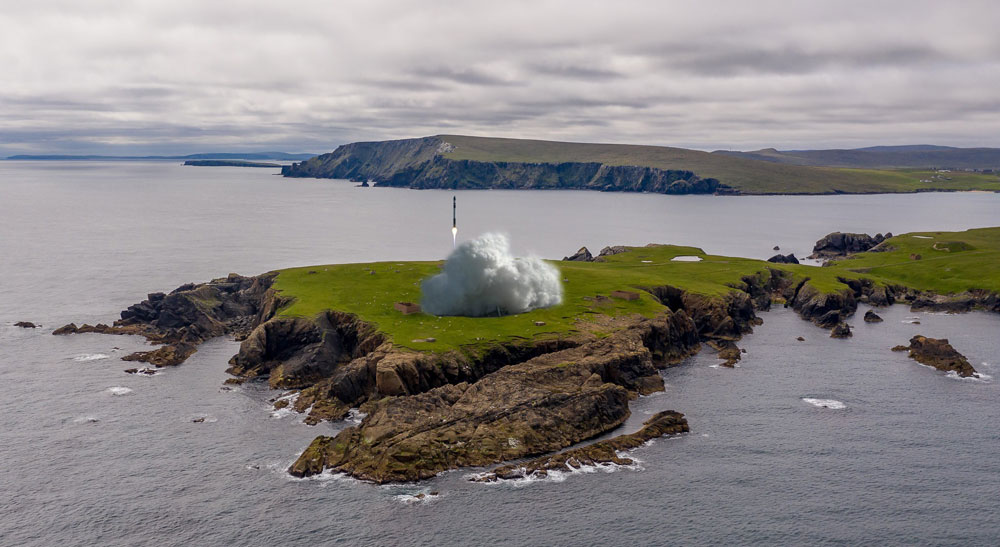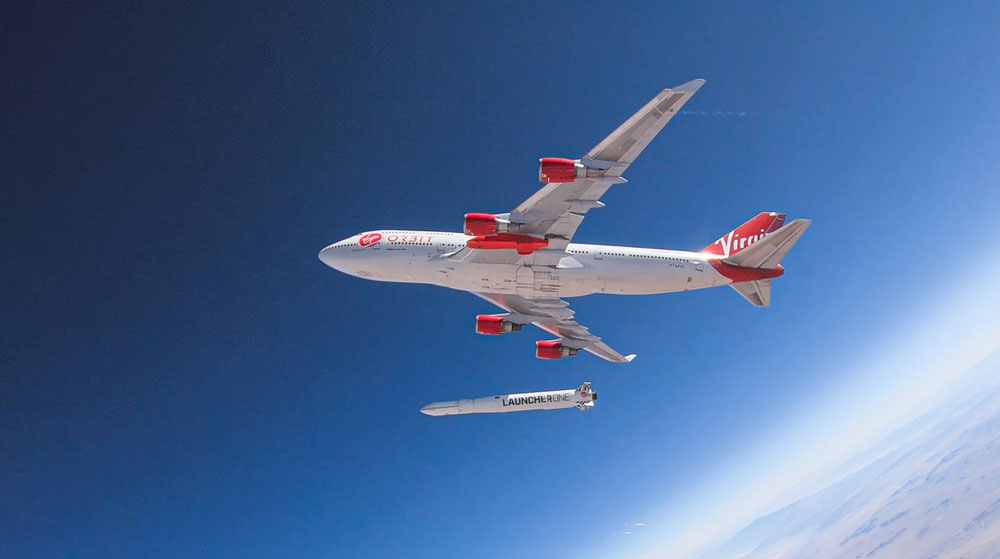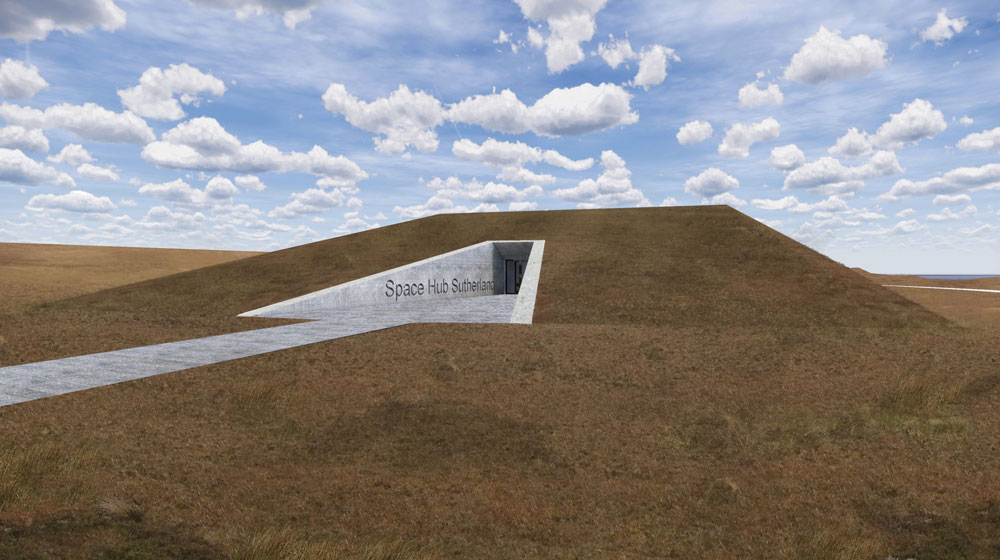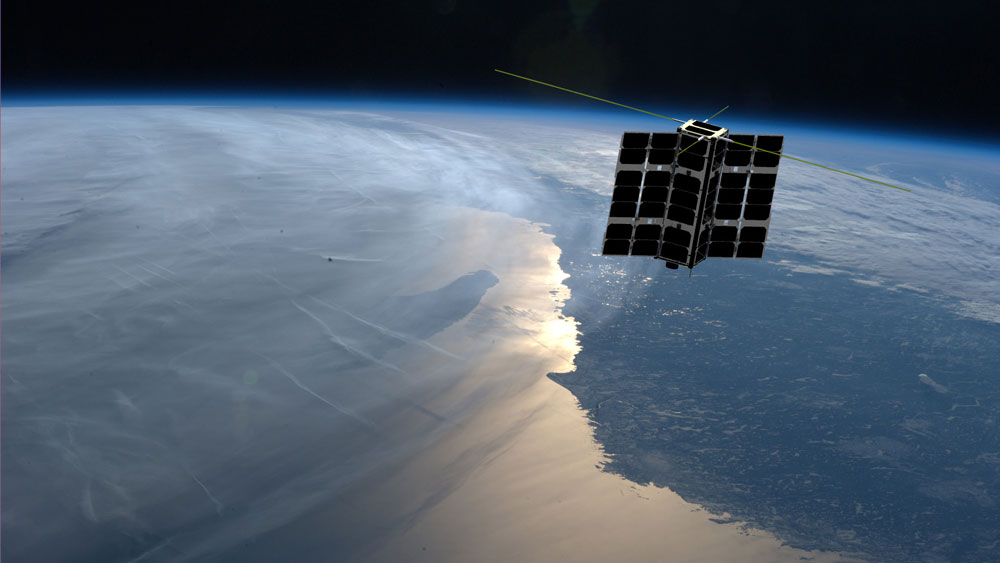SPACEFLIGHT UK space launch
Countdown to UK launch
IAN ANNETT, Deputy CEO, UK Space Agency gives an update on two exciting space races – one to be the first commercial company to launch into orbit from UK soil and the other to be the first European country to develop its own small satellite launch capability from the northern hemisphere.
 SaxaVord Spaceport, previously known as Shetland Space Centre, is a planned spaceport to be located on the Lamba Ness peninsula on Unst. Saxavord
SaxaVord Spaceport, previously known as Shetland Space Centre, is a planned spaceport to be located on the Lamba Ness peninsula on Unst. Saxavord
The year 2021 was a pivotal year for the global space economy, exploration of the Universe and the diversification of commercial activities in space. The world watched as private companies demonstrated the ability to reach space for private citizens and built a strong reputation for consistent and reliable services to the International Space Station (ISS), offering a competitive price point without compromising safety. While many may think of such private exploits as flights of fancy, the determination and tenacity of individuals, such as Sir Richard Branson, Jeff Bezos and Elon Musk have publicly demonstrated a pivotal shift away from government-controlled programmes, towards a more commoditised space-tech industry.
 This fleeting moment is an important one for the UK government to recognise, by seeking to catalyse investment and close the gap between an ever-accelerating global space economy for leading space nations.
This fleeting moment is an important one for the UK government to recognise, by seeking to catalyse investment and close the gap between an ever-accelerating global space economy for leading space nations.
The UK government’s clear ambitions to address this opportunity were made clear through the publication of the National Space Strategy in September 2021 which seeks to make the UK one of the most innovative and attractive space-tech economies in the world, cementing our role as a science superpower and unleashing a wave of innovation across the country. The UK Space Agency will play a unique role in the strategy’s successful delivery through our work to catalyse investment in the sector, deliver national capabilities and programmes, alongside and on behalf of government departments, and champion the role of space to ensure we can maintain our global voice and inspire the next generation of scientists, engineers, lawyers and businesssavvy space entrepreneurs that will cement the UK’s pivotal position as a spacefaring nation.
The clearest example of how the UK Space Agency supports these areas is our spaceflight programme – Launch UK. This exciting, yet immensely complex, endeavour aims to establish the UK as Europe’s leading small satellite launch destination and, with the first launches planned for later this year, we are on the cusp of turning years of hard work behind the scenes into reality. While the UK has a strong heritage in the broader space sector from design, manufacture, operations and exploitation that stretches beyond the Black Arrow programme of the 1960s and 70s, it is understandable why many people question the need for our own launch capability and why we are investing in these ambitions.
Context
The drive towards the greater commercialisation of space is evident to anyone who regularly watches the news. As mentioned above, Jeff Bezos and Sir Richard Branson have both flown to space on launch vehicles developed by their own companies, while Elon Musk and SpaceX regularly deliver crew and cargo to the International Space Station and continue to break launch records – the Falcon 9 successfully launched 31 times in 2021.
However, away from the media spotlight, there have been rapid advances in technology that have driven a boom in the demand for increasingly capable, small, low-cost satellites. An example, relevant to UK investment, is OneWeb which is on track to expand commercial connectivity services globally this year, allowing the UK access to our own global fleet of satellites, providing fast UK-backed broadband internationally and creating jobs and technical expertise at home.
THE UK SPACE AGENCY HAS PROVIDED OVER £40M IN INDUSTRY FUNDING TO GROW THE UK’S SPACEFLIGHT CAPABILITIES AND PUT IN PLACE THE CONDITIONS TO ACHIEVE OUR LAUNCH AMBITIONS
Dedicated small launch allows operators of small satellites to secure timely and reliable launch to their preferred orbit – a key enabler for new business opportunities far broader than the space economy and bringing services rapidly to the market. In addition, many other launch operators are offering rideshare opportunities at costs that would have been unimaginable a few years ago, opening opportunities from academia to life sciences, from security to climate change and a host of other missions that are constrained only by our imagination.
This growth is attracting record levels of private investment and causing the global demand for small (<1000kg) satellite launch to grow. Bryce Space estimated that, in 2012, small satellites made up just 1% of the total mass of satellites launched into orbit, rising to 11% by 2019, fuelling increasing financial market interest in space-tech. Indeed, 2021 saw many private upstream and downstream companies go public, such as Arqit, Virgin Orbit and Spire Global to name just a few.
As well as the commercial opportunities which they present, establishing a launch capability in the UK will help to address a gap in the UK space supply chain by offering small satellite manufacturers from around the globe a direct route to launch from UK spaceports. This will leverage the UK’s position as a world leader in small satellite manufacturing – companies, such as Spire Global and AAC Clyde Space making Scotland the largest manufacturer of satellites in Europe – and set the UK well on our way to becoming the leading provider of commercial satellite launch in Europe by 2030. This will not only act as a major strategic step forward in establishing the UK as a leading spacefaring nation and science superpower, it will also create a vibrant space economy which will positively inform and help deliver many of the government’s strategic priorities, such as improved connectivity and delivering our net zero commitments.
Work to date
Since the spaceflight programme launched in 2018, the UK Space Agency has provided over £40m in industry funding to grow the UK’s spaceflight capabilities and put in place the conditions to achieve our launch ambitions. This has secured joint investment from the private sector of nearly £80m for the grant projects.
 Virgin Orbit will launch Oman’s first satellite, with its 747-based launch system taking off from Spaceport Cornwall, later this year. Virgin Orbit
Virgin Orbit will launch Oman’s first satellite, with its 747-based launch system taking off from Spaceport Cornwall, later this year. Virgin Orbit
Further investment still beyond the grant projects has been catalysed, such as the private investment in Shetland spaceport and other spaceflight-based investments. This investment from the private sector would not have been achieved without close collaboration between government departments, industry, emerging operators and established launch providers, and orchestrated through the UK Space Agency.
Grants awarded by the UK Space Agency to date include £2.5m to Highlands and Islands Enterprise to develop Space Hub Sutherland, £5.5m to Orbex to build a new rocket for launch from Sutherland and £23.5m in two separate grants to Lockheed Martin to establish launch operations at SaxaVord Spaceport in Shetland and perform flight demonstration of a new Orbital Manoeuvring Vehicle.
Furthermore, the UK Space Agency has boosted the UK’s horizontal launch capabilities by providing £7.35m to support horizontal launch by Virgin Orbit from Spaceport Cornwall and £1.3m to develop business plans for small satellite launch and sub-orbital flight from potential spaceports in Machrihanish, Snowdonia and Cornwall. These investments are aimed as a catalyst for long-term growth across the space tech sector and UK economy to attract investment from space companies around the world to come to the UK and benefit from these commercial opportunities.
Crucial to cementing the UK’s role as Europe’s most attractive launch destination is having in place a flexible and sector-friendly regulatory and licensing environment. In July last year, the Space Industry Act 2018 and the accompanying regulation came into force to enable launches to take place from the UK from 2022.
The most modern and progressive spaceflight regulations in the world, this legislation is underpinned by a focus on keeping the public safe, protecting the environment on Earth and in space, and safeguarding our national security. In line with best practice, the sensible decision was taken to establish a single, independent regulator for aviation and spaceflight activity, with the Civil Aviation Authority (CAA) taking on this role from the UK Space Agency.
To support innovation within the sector and avoid overly prescriptive operating requirements, operators of launch vehicles and spaceports will be required to demonstrate to the CAA that any risks have been managed to an acceptable level, according to the established ALARP (as low as reasonably practicable) principle. This will enable the UK to cater for a wide range of current and future spaceflight technology, with the flexibility to support the pace of innovation safely.
 Four British space companies, Orbex, Skyrora, D-Orbit and Space Forge, have successfully secured a total of over £10m to develop small satellite launch technologies.
Four British space companies, Orbex, Skyrora, D-Orbit and Space Forge, have successfully secured a total of over £10m to develop small satellite launch technologies.
The aim of this approach will support the growth of a safe, sustainable and lucrative launch industry, as well as other related space industries, without imposing excessive bureaucratic or cost burdens. For example, it will ensure that insurance requirements for all missions are proportionate to the associated risk and are affordable, so that space companies are not deterred from doing business in the UK. It is also important to note that policy and guidance will not remain static and it is the intention for the CAA, the UK Space Agency and government departments to monitor the implementation of such an approach and continue to meet the changing market without compromising safety.
In addition to establishing a sound regulatory environment, the UK Space Agency has leveraged its strong international relationships to ensure UK companies have access to global markets, financing and supply chains around the world and to create a commercially attractive launch offer for international customers in the globally addressable launch market. For example, the Technology Safeguards Agreement paves the way for US companies to operate from UK spaceports and export their space launch technology, enabling UK companies to access revenues and customers that would otherwise be out of reach.
Co-operation has also been secured from key nations through agreements setting out how we will manage launches which fly over or near their territories. This will not only provide UK launch companies with greater flexibility over their spaceflight operations but also offer certainty over the expectations when operating in or near countries’ maritime Exclusive Economic Zones (EEZs).
Key to establishing a sustainable launch market in the UK is a confident space-tech sector and broader ecosystem of supporting industries and the UK Space Agency is committed to ensuring UK businesses can harness the commercial opportunities associated with launch by contracting and investing in the UK over multiple years, rather than single-year grants. Options to consider contracting, longer-term grants, challenge funds and equity investments should all be considered as tools that can invigorate the breadth of the UK’s space industry to ensure it competes well in the international context.
Last year, four British space companies, Orbex, Skyrora, D-Orbit and Space Forge, successfully secured a total of over £10m to develop their world-leading small satellite launch technologies and bring them to market through the European Space Agency’s (ESA) Commercial Space Transportation Services programme (CSTS), a programme aimed at providing tailored support to national launch companies and related infrastructure.
The UK’s investment – one of the largest of all ESA Member States – will support our goal of ensuring the UK is at the forefront of the European space industry through the provision of attractive and reliable services and launch capabilities, located across the breadth of the country and supported by stable regulatory and legal frameworks.
 The UK’s first satellite launch Space Hub is due to be constructed in Sutherland, Scotland. Norr
The UK’s first satellite launch Space Hub is due to be constructed in Sutherland, Scotland. Norr
Preparing for launch
This year will be an incredibly exciting period for the UK, and particularly the space-tech sector, as spaceports and launch operators ramp up their preparations towards launch. To reference just a few, in January Spaceport Cornwall’s anchor customer Virgin Orbit achieved the third successful flight of its LauncherOne vehicle from the US, the same technology that will be used to launch from Cornwall later this year.
 In an almost symbolic gesture to the importance that Virgin’s global capability will offer, it was piloted by a Royal Air Force pilot on secondment to Virgin Orbit, seeing LauncherOne successfully deploying seven small satellites into orbit, including one manufactured in Scotland by Spire Global. These satellites were shipped from Glasgow to California for the launch, demonstrating the potential value to the UK satellite industry of having a new launch capability in the UK.
In an almost symbolic gesture to the importance that Virgin’s global capability will offer, it was piloted by a Royal Air Force pilot on secondment to Virgin Orbit, seeing LauncherOne successfully deploying seven small satellites into orbit, including one manufactured in Scotland by Spire Global. These satellites were shipped from Glasgow to California for the launch, demonstrating the potential value to the UK satellite industry of having a new launch capability in the UK.
In terms of site readiness, as an existing airport, much of the Spaceport Cornwall infrastructure already exists, with the ground operating systems to enable horizontal launch scheduled for completion in spring 2022. This will mark the UK’s readiness to deliver launch and will act as a clear sign to the rest of the world that the UK is Europe’s premier small satellite launch destination.
ABL Space Systems, Lockheed Martin’s official launch partner to deliver the Pathfinder launch from SaxaVord Spaceport, is planning the maiden launch of its RS1 rocket from Pacific Spaceport Complex Alaska on Kodiak Island later this spring. RS1 is the same rocket that is planned to launch from SaxaVord Spaceport in Shetland later this year. From SaxaVord, the rocket will place an orbital manoeuvring vehicle (OMV) (developed by Moog in Reading) into orbit that will then deploy up to six 6U CubeSats. While Lockheed Martin has secured the first launch through a UK Space Agency grant, ABL expects to undertake regular launches from SaxaVord spaceport over the coming years, demonstrating how creating confidence around the UK market generates further investment.
 The UK is aiming to tap into the growth for smallsat companies such as Spire Global, (which builds its satellites in Scotland) that need access to space. Spire Global
The UK is aiming to tap into the growth for smallsat companies such as Spire Global, (which builds its satellites in Scotland) that need access to space. Spire Global
Of the vertical launch sites, construction of Space Hub Sutherland and SaxaVord Spaceport is due to begin early in 2022. Space Hub Sutherland was the first spaceport to receive planning permission and will include a launch pad, control centre and associated infrastructure for the transport and preparation of launch vehicles and has been designed to cater for the needs of multiple launch companies and vehicles. The planning permission currently limits the number of launches at 12 per year and Highlands and Islands Enterprise does not anticipate that any structural upgrades to the road network will be necessary to manage the relatively low increase in traffic volumes during both construction and operations of the site.
Rocket manufacturer Orbex, which plans to launch from the site is currently constructing a state-of-the-art rocket test facility in Kinloss, Scotland. The new test launch platform, known as Orbex LP1, will support the testing of Orbex’s Prime rocket, designed to transport small satellites to low Earth orbit.
Planning approval of SaxaVord Spaceport was granted early in 2022, and contractors have commenced construction on the site, as well as road improvements. A ground station is already operational at SaxaVord, generating both capabilities and jobs and the ongoing work will create three launch pads at the site, on the island of Unst, the northernmost island in the UK. These collective sites will create jobs not only in the local community but right across the UK. For example, SaxaVord Spaceport anticipates that the total impact from the operation of the proposed development will support 255 jobs in Scotland, including 139 in Unst.
Elsewhere, Prestwick Spaceport near Glasgow has progressed to the planning application stage of its proposed development, with the aim of conducting its first launch by the end of 2023. The proposed spaceport development is part of wider aerospace and space industry plans being funded with £32m from the UK government (subject to business case approval), £30m from the Scottish government, and £18m from South Ayrshire Council as part of the £251m, 10-year Ayrshire Growth Deal.
The project, owned by the Scottish government, is projected to create up to 4,000 jobs. Plans are also advancing for proposed spaceport sites in Machrihanish and North Uist in the Western Isles and Spaceport Snowdonia Space in Wales, highlighting the geographic breadth of the UK’s spaceflight offer – creating exciting opportunities right across the UK.
Conclusion
There is no denying that a new global race is on to see who can best capitalise on the social and economic advantages that space can bring. There is also a seemingly unbounded thirst for interest from both young and old in the UK’s endeavours for space, whether related to climate change, exploration of the Universe or supporting societal improvements through access to space-based services.
Creating a commercial spaceflight market in the UK will be a massive achievement, sustaining and creating highly-skilled jobs across the country and much-needed local opportunities in areas near the remote spaceports. The UK can seize a strong and distinct leadership role, by building on our unique strengths and global influence to do what others cannot. Along the way to developing this brand new UK space capability, there are significant opportunities to catalyse greater investment from the thriving private space sector, develop our own national capabilities where required, and inspire our next generation of scientists and engineers to launch their careers and ambitions.
The UK is in a commanding position to compete in this newly defined space race, with the skills, industrial agility and commitment to corner the European launch market. The UK Space Agency is working vigorously to make 2022 the most exciting and memorable year yet for our spacefaring nation.
 SaxaVord Spaceport, previously known as Shetland Space Centre, is a planned spaceport to be located on the Lamba Ness peninsula on Unst. Saxavord
SaxaVord Spaceport, previously known as Shetland Space Centre, is a planned spaceport to be located on the Lamba Ness peninsula on Unst. Saxavord This fleeting moment is an important one for the UK government to recognise, by seeking to catalyse investment and close the gap between an ever-accelerating global space economy for leading space nations.
This fleeting moment is an important one for the UK government to recognise, by seeking to catalyse investment and close the gap between an ever-accelerating global space economy for leading space nations.



